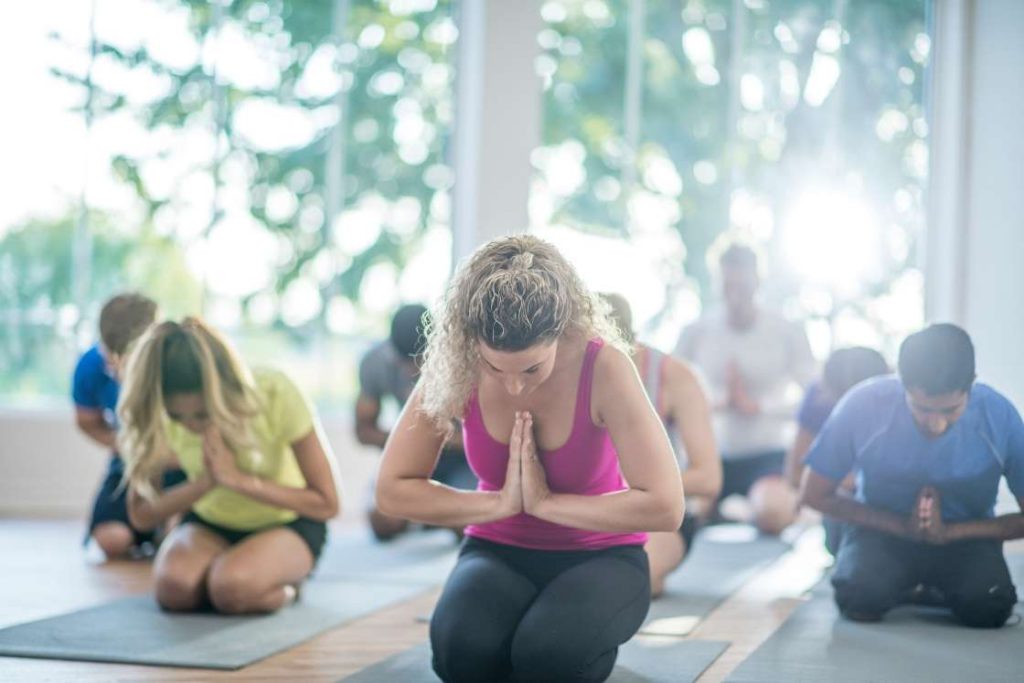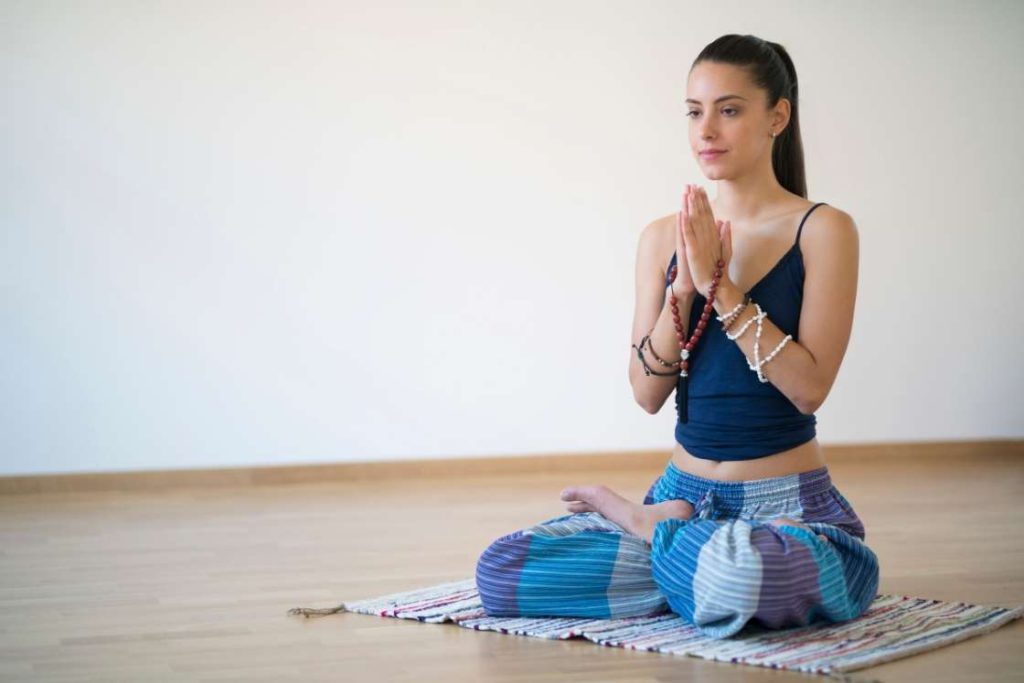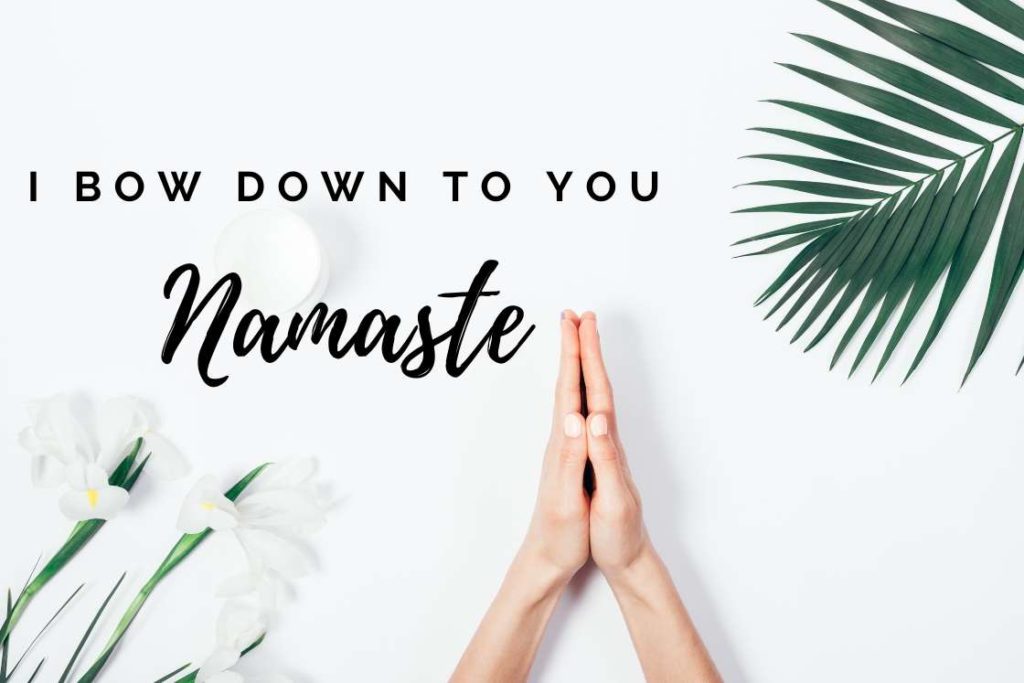Namaste is greater than only a well mannered greeting; it’s a gesture rooted in India’s non secular and cultural traditions. Not like informal salutations similar to “Hello” or “Good day,” Namaste carries layers of which means, symbolising respect, humility, and the popularity of the divine essence inside one other particular person.
The follow of Namaste dates again to the Vedic interval, the place sages and students seen it not solely as a social customized but in addition as a aware act linked to vitality and consciousness. This straightforward gesture, carried out by becoming a member of the palms on the coronary heart centre, embodies a mix of science, spirituality, and holistic knowledge that continues to carry relevance right this moment.
What does namaste means?
The phrase Namaste has its roots in Sanskrit, the sacred language of Hinduism. It comes from two phrases: namah which means “I bow,” and te which means “to you.” At its most direct stage, Namaste interprets to “I bow to you.”
Nonetheless, its which means goes far past a literal bow. Within the Vedic worldview, divinity is just not restricted to temples or deities it exists inside each residing being. Namaste displays this perception. When spoken with the accompanying gesture of folded palms, the deeper sense of the phrase turns into:
“The divine in me bows to the divine in you.”
Over time, many translations and interpretations have been supplied, every carrying the identical essence of reverence and unity. A few of the most generally embraced embody:
- I honour the place in you that can be in me.
- My soul recognises your soul.
- I bow to the place in you that’s love, gentle, and pleasure.
- Whenever you and I bow to our true nature, we’re one.
- We’re the identical, we’re one.
- I honour the place in you the place your complete universe dwells.
Collectively, these meanings present that Namaste is not only a greeting; it’s an acknowledgment of shared divinity and the unity of all existence.
Are namaste and namaskar the identical?

Whereas Namaste is extensively recognized, its shut counterpart Namaskar (or Namaskaram in South India) can be a conventional greeting. Each come from Sanskrit and share the basis namah (“to bow”), however they differ barely in which means and utilization.
- Namaste combines namah (“I bow”) with te (“to you”), and is commonly utilized in private, one-to-one greetings.
- Namaskar (from namah + kara, “doing”) actually means “I supply salutations.” It’s thought of a extra formal or collective greeting, generally used when addressing a gaggle or viewers.
In follow, the excellence is refined. For instance, an artist at a live performance might open with Namaskar to greet your complete gathering, whereas Namaste is extra pure in private interactions.
Thus, whereas each specific reverence and respect, Namaskar emphasises the act of paying salutations, and Namaste highlights the acknowledgement of the opposite particular person’s internal divinity.
What are the social implications of namaste?

Making Namaste part of every day life is just not solely a non secular act but in addition a social bridge. When practiced frequently, it brings steadiness to ideas, feelings, and behavior qualities that naturally replicate in a single’s character and relationships. Folks typically discover such presence calm, respectful, and nice to be round.
In India, Namaste has been woven into tradition for hundreds of years as a gesture of respect, humility, and non secular consciousness. Its symbolism goes past phrases; the easy act of becoming a member of palms and bowing the pinnacle creates an instantaneous sense of concord.
For Indian society, the gesture carries a deep cultural reminiscence. Seeing somebody greet with Namaste invokes familiarity, heat, and acceptance. By adopting Namaste in on a regular basis interactions, you align with a follow that makes social connections extra welcoming and respectful.
Scientific significance

Though Namaste is finest recognized right this moment for its social and cultural which means, its roots lie deep inside yogic science. The gesture itself is a mudra particularly Anjali Mudra—which performs a significant function in each yoga follow and non secular self-discipline.
In Anjali Mudra, the palms are pressed along with fingers pointing upward, positioned near the chest, throat, or brow. When mixed with the respectful bow and spoken phrase, this turns into the gesture of Namaste. Thus, merely folding the palms is just not Namaste; it’s Anjali Mudra, which turns into Namaste when used as a greeting.
From a physiological perspective, our palms are wealthy in nerve endings and stress factors, lots of that are recognised in yoga, Ayurveda, and reflexology. Urgent the palms collectively stimulates these factors, balances vitality channels, and calms the nervous system.
Yogic science additionally explains Namaste because the union of opposites. The human physique displays twin energies; optimistic and damaging, yin and yang, masculine and female, prāna and apāna, sattva and tamas. These polarities are stated to move by means of the left and proper sides of the physique. By becoming a member of the palms, we symbolically and energetically carry these two forces into concord, creating steadiness inside.
This act of unity affords a number of advantages, together with:
- Improved focus and centred consciousness
- Calming of the thoughts and discount of stress
- Activation of refined vitality channels (nadis)
- A way of internal alignment and wholeness
On this means, Namaste is just not solely a cultural greeting but in addition a scientifically rooted yogic follow designed to harmonise physique, thoughts, and spirit.
Non secular significance of namaste
In yogic and non secular traditions, each type of creation is believed to emerge from a single common supply the place all forces unite. A hint of those forces exists inside each being as completely different energies. The essence of spirituality is to harmonise these energies and reconnect with that supreme supply.
This supply, nevertheless, can’t be perceived straight by means of abnormal senses. It’s skilled by means of internal alignment once we steadiness and channel our inner energies into concord, we start to really feel the presence of that common reality.
The gesture of Namaste, carried out with Anjali Mudra, is considered a robust device for this alignment. By becoming a member of the palms on the coronary heart centre, we symbolically unite the twin forces inside us and supply them to the upper supply. This act cultivates humility, give up, and a way of oneness with creation.
Due to this, Namaste is just not solely a social greeting but in addition a non secular follow. Yogic texts and traditions advocate it as a method of centring the self, invoking internal peace, and deepening the journey towards self-realisation.
When it’s utilized in yoga?

Amongst yogis, Namaste is likely one of the mostly used Sanskrit phrases, symbolising respect, gratitude, and unity. In yoga lessons, it’s sometimes used at each the starting and the tip of a session.
- In the beginning of sophistication – When the trainer arrives, they typically greet the scholars with Namaste earlier than chanting the opening prayer or mantra. College students may trade Namaste with one another as a humble means of starting their follow collectively.
- On the finish of sophistication – After Śavāsana (remaining leisure), practitioners rub their palms gently and convey them collectively on the coronary heart or brow centre in Namaste. This closing gesture honours the vitality cultivated throughout follow and acknowledges the trainer, fellow college students, and the internal self.
On this means, Namaste bookends the yoga session inviting mindfulness at first and sealing the follow with gratitude and concord on the finish.
In asanas follow
Namaste as Anjali Mudra may be very typically utilized in completely different asanas and meditation practices throughout a yoga session. You may follow the Namaste whereas in any sitting posture or standing in Tadasana, Vrikshasana, Ardha Matsyendrasana or Vajrasana. These are just some examples however you may follow Namaste in any pose, that retains your palms free.
- In the beginning: Each yoga pose has a specific bodily and psychological requirement. The namaste mudra brings the energies of your physique in concord, which prepares your muscle tissue and nerves for the stress they’re about to face. The Namaste pose with deep respiratory earlier than a posture will assist improve your blood move, enhance oxygen consumption and stimulate your neural pathways. Virtually, warming up your physique for the pose.
- In the course of the maintain: Throughout any maintain of a pose, Namaste triggers and stimulates a whole lot of organic advantages for various particular physique organs and muscle teams. In the course of the pose maintain, the Namaste mudra will open up the involved vitality gateways and regulate an unfettered move of vitality.
- On the finish: Practising Namaste Mudra on the finish of a yoga pose is especially efficient in normalizing your thoughts and physique. Every pose creates turbulence of energies in your physique. Which additional results in the disruption of regular move, to mechanisms like blood move, hormonal actions, lymphatic actions, and so forth. The Namaste mudra after a pose relaxes your physique, by harmonizing the turbulent energies and restoring all bodily mechanisms to their common tempo.
The right means of doing namaste
The Namaste gesture might seem easy, however its effectiveness lies within the exact placement of the palms and posture. Completely different cultures and yogic traditions might present slight variations, however these are intentional and systematic. Right here’s tips on how to carry out Namaste appropriately at completely different ranges:
- Namaste in entrance of your brow: Increase your palms to the peak of your brow, and be part of the palms of your palms, proper in entrance of your brow. Preserve your elbow joints on the peak of your shoulders. Don’t press your palms onerous, however gently hold them held in opposition to one another. Do hold any area between your fingers, and hold them straight pointed upward. The center of our palms have a slight melancholy, and this area will create a niche inside the be part of of your palms. Keep this hole.
- Namaste in entrance of your throat: For this Namaste, all the pieces stays the identical from the earlier directions, besides your palms come down in entrance of your throat. And your elbow joints come all the way down to the extent of your chest.
- Namaste in entrance of your chest: As soon as once more all directions stay the identical, besides your palms come down in entrance of your breastbone and your elbow joints come all the way down to the extent of your stomach. On this gesture, alternatively, you may hold your elbows parallel to the bottom by sustaining your elbow joints at your chest stage.
What modifications will namaste carry to your life?

The follow of Namaste brings many bodily, psychological, emotional, and character modifications. Relaxation assured these modifications will show to be optimistic and helpful in your life. Though you could not count on any in a single day modifications. Mudras make many refined vitality tweaks throughout your physique, that over time construct up to attract distinguished modifications. So that you should be affected person and devoted.
1. Namaste harnesses the facility of consciousness
Whenever you carry out Namaste in entrance of your brow, you consequently flood your third eye or the pineal chakra with harmonious vitality move. Your pineal gland performs an elemental function in consciousness, focus, notion, and cognition. Namaste gesture ensures that there’s an unobstructed and harmonious vitality move in your neural pathways. With common follow of Namaste, you would notice that this can be a gesture that harnesses the facility of consciousness.
2. Namaste enhances the power to speak
Whenever you carry out Namaste in entrance of your throat, you activate your throat chakra. The chakra is chargeable for your vocal communication. Namaste gestures enhance the vitality move to your vocal apparatuses, muscle tissue, and nerves. The gesture may even enable you develop the focus wanted to kind your ideas and the mind to transform them into phrases. When the namaste is carried out in entrance of the throat, whereas sitting in a straightforward pose, and chanting Om, it may enable you remedy infections and issues associated to the Ear, Nostril, and Throat area. It should additionally provide you with nice management over your vocal muscle tissue, as such, over your voice and tone.
3. Namaste for a greater cardiovascular and respiratory perform
Practising Namaste pose in entrance of the breastbone prompts the Anahata chakra. Whenever you follow the Namaste pose in entrance of your breastbone, whereas standing within the mountain pose or tree pose, it has the potential to enhance your blood move. An improved blood move can remedy an extended checklist of cardiovascular issues, and as such, enhance your cardiovascular capabilities usually. On one other hand, if you sit in a straightforward pose, take deep breaths and carry out the Namaste gesture in entrance of your chest, it improves the oxygen administration in your lungs.
4. Namaste is the go-to gesture for spirituality
Whenever you follow the Kailash mudra variant of the Anjali mudra, it should stimulate your crown chakra. Your crown chakra is your gateway to the common energies outdoors your bodily existence. This gesture is a extremely meditative gesture, that may enable you enter a state of samadhi, or complete absorption.
5. Namaste balances your polar extremes
The very fundamental idea of Namaste is to carry steadiness to the other energies in your physique. Namaste, all of its variants, will successfully enable you attain a steadiness between the female and masculine energies inside you. In case your emotion is a female vitality, your logic is masculine. And in each scenario of life you have to equal measures of each logic and emotion.
One other comparable instance is the steadiness of creativeness and self-discipline, the place creativeness is a female power and self-discipline is masculine. And because it occurs for any creation, you have to a good quantity of each creativeness and self-discipline. Namaste will enable you reach completely different spheres of life by establishing a steadiness between your female and masculine energies.
Conclusion
In on a regular basis life, Namaste is most frequently used as a respectful greeting. It conveys politeness and humility when assembly strangers, associates, or acquaintances. Past this social function, the gesture additionally carries deep which means inside yogic traditions and non secular practices, the place it’s used to centre the self and honour the divine in others.
In Indian tradition, Namaste can be a gesture of gratitude and reverence generally supplied to elders, lecturers, and mentors. It could additional specific sincerity when making a request, reflecting honesty in a single’s intentions.
Thus, Namaste is greater than a easy salutation. Whether or not utilized in every day interactions, in yoga follow, or in non secular rituals, it symbolises respect, humility, and the popularity of shared divinity.


